Some folks seem to be born with a knack for networking and marketing themselves. You know the type. Those extroverted communicators who can talk to anyone, anytime, online or in person. The right words just seem to flow out of them, effortlessly. They listen, interact and make personal connections one right after the other. Many of the skilled and talented music producers I know are much more introverted—with hours spent in the bedroom studio with their DAW, focused on the sounds and ideas coming out of their high-end near field monitors.
Sometimes we go for hours at a time without any human interaction at all.
Well, it turns out that building a fanbase and creating business relationships and opportunities really does happen during these times when we’re concentrating on our music. Simply by building a catalogue, you are marketing. By staying home and creating/refining your catalogue, you are improving your real position in the marketplace. Maybe not your immediately apparent messaging that shows up on flashy Instagram pics, a robust professional contact list and being seen. After all, we are producers. We’re more behind the scenes anyway.
Real marketability in the game of selling beats is to have a lot of great product online. It’s a numbers game. The more well-mixed tracks and stems you have under your name with captivating cover design and working titles, the more you sell.
Many artists—when browsing beats—don’t care how many Instagram followers a producer has. They want something that sounds dope that fits with their vibe. The more you put out, the wider net you cast.
A beat collection should have 15-20 beats. They should be united by a theme, tone, style, or sound that makes them feel like a collection. Give it a name. Come up with some artwork, like an artist does for an album. Similar to when a fashion designer puts out their fall collection, it should have a certain twist on your distinctive style.
A positive side effect of this type of hustle is that you keep getting better at producing! When you are finishing tracks regularly, you are honing your craft and refining your sound. Have it presented in a way that is accessible and alluring. Let the platforms like BeatStars and Airbit do the marketing for you. These online communities are well-known, with a wide reach, and have an easy-to-use distribution network.
Be prepared to budget for these services. Facebook and Google Adwords can drive a lot of traffic to your catalogue, but it costs money. Start saving now. How much can you budget for this?
It may not be as exciting as buying that new controller or sample pack, but once you have that first catalogue, the investment in promotion has so much more potential to help you take the turn to full-time pro than any gear does.
In our latest podcast, ATL via Flint, MI producer Dillio tells me that marketing music doesn’t come naturally to him. “Allow yourself to make mistakes and never stop learning,” he reminds us as we discuss the ever-evolving music industry from the perspective of a focused and experienced—yet still up and coming—professional music producer.
The benefits of music marketing, online courses, and mentorships that can help you sell beats almost always outweigh the costs. It’s all about finding a teacher and curriculum that speak to you. Because as you learn, you uncover golden nuggets of information or insight (a-ha!) that could be the very thing that help you get to the next level and change your life.
“Chance favors the prepared mind” – Louis Pasteur
Dillio and I also discuss the importance of building a catalogue and how it prepares us for opportunities that will arise as we network and meet more people in the music community, online or otherwise. It helps us be ready to do business at a moment’s notice. One of the mistakes many producers make is not having a catalogue of beats finished and purposed for other artists to browse and buy.
There are many ways you can optimize your chances of getting those coveted exclusive licenses that can pop for 2 grand or more. You can also up the market value of your beat by writing and recording vocals for the hook. If that track is on its own stem, it is easy for the end user to mute them if they don’t want to license the vocals. It’s like having options on a car. Trick out each beat so it feels like a real value for the rapper or singer that wants to spit on it for $25, or for the Japanese pop act that wants to take it exclusively on tour.
Choco found this beat of Dillio’s while browsing tracks on BeatStars, who by the way just reached a new milestone as their producers have officially earned over $50 million cumulatively through their online community. Congrats BeatStars!
So yes, there is money to be made. The industry is thriving and we all have access to great modern distribution and a global market. It’s just a matter of creating a prolific catalogue of music—consistently. But that should be no problem right? That’s what producers do.
Listen to Dillio2K on SoundCloud
Connect with Dillio2K on BeatStars
If you enjoyed this article, check out the Beat Studies Podcast featuring radio-style talk and insightful conversations with vocalists, producers and industry professionals who create the music and culture that we love.


